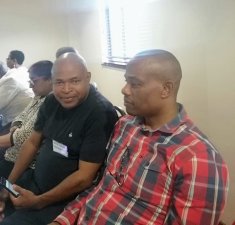The action research journey of Mthokozisi Wanda and Muzi Khoza, Ilembe district officials for teacher development
For Mthokozisi Wanda and Muzi Khoza, an action research collaboration was obvious and natural, because ‘IQMS and CPTD work hand in glove.’ The reflection on their daily practice resulted in a mind-shift and a different way of acting. ‘The job remains the same, but our approach has changed.’
‘My first name is Mthokozisi, but everyone calls me by my last name’, Wanda laughs. Mthokozisi Wanda and Muzi Khoza both work for the Ilembe district in the KwaZulu-Natal province under teacher development. They participated in the first KZN action research (AR) cohort. Their AR questions were: ‘How can I support my educators in implementing integrated quality measurement systems (IQMSs) and continuous professional teacher development (CPTD)?’

‘We collaborated throughout the entire action research process, because IQMS and CPTD work hand in glove’, Wanda and Muzi explain. The purpose of integrated quality measurement systems is to monitor the effectiveness of the institution, evaluating the performance of the educator and identifying specific needs for support and development. This creates an enabling environment for teacher development. Teachers are expected to grow their knowledge and skills throughout their careers, engaging in continuing professional teacher development activities. This is organised by the South African Council for Educators (SACE).
‘Gaps are an opportunity’
‘Some schools were struggling to apply the IQMS and CPTD policy correctly. We realised there was a need to assist’, Muzi says. One of their means to identify the gaps, was a department survey. ‘It appeared that some of the teachers had no username or password, which kept them from uploading their points to the system’, Wanda says. ‘The results of the survey gave us an opportunity to conduct workshops for all the circuits in the district’, Muzi adds.
‘We have learned how to listen’
‘The job remains the same, but our approach has changed’, says Muzi. Their action research trajectory triggered a mind-shift, which resulted in a different approach. ‘We have learned how to listen’, Wanda explains. ‘We would always come up with solutions before even listening to what our educators needed from us.’ ‘We now provide our services based on the educators needs’, Muzi laughs. ‘We work like the slogan for food and beverage: how can we help you?’
'Our job is to support, not to judge'
Action research focuses on data collection, which encourages to verify the reasons behind a challenge, without making assumptions. ‘This is where we appreciate the presence of VVOB’, Muzi explains. ‘There might be different reasons for a person when he or she isn’t able to do what he is supposed to. Our job is to come in and support, not to judge.’ Muzi and Wanda now act with more respect for each individual educator and the context behind a challenge. ‘Everyone learns in a different way’, Wanda says. ‘We must give educators a chance and be persistent with them.’
‘It affects our practice’
Action researchers reflect on their daily practice. ‘Even up until today, the listening is what affected our practice the most’, Muzi explains. ‘And it goes a very long way. We now listen without interfering.’ Wanda laughs: ‘Not to interject was difficult in the beginning. We were only used to speaking. Now, it is something that we enjoy.’ ‘The act of listening until a person finishes, is a new skill’, he smiles. ‘That was my aha-moment.’
‘Teachers have the know-how’
‘Action research goes beyond peer learning and collaboration’, Muzi explains. ‘During the sessions, we learned from our colleagues. From their experiences, their strategies and approaches.’ Wanda elaborates: ‘And we learn from the teachers themselves. They are the ones with the most know-how on how to tackle challenges. We now make use of that, which enables us to go further with our support.’

‘Educators are not afraid anymore’
‘Our newly adopted approach resulted in a sense of honesty’, Muzi says. ‘Before, the educators were looking at us like officials, as if we were going to tell on them. Now we are open. They are able to honestly say if they don’t understand or know something.’ This allowed Wanda and Muzi to grow closer to their community of teachers and schools. Wanda explains: ‘Action research taught us how to be patient. Our educators are not afraid to express themselves anymore.’
‘Without searching for the hinges, we used to say “Why are you not uploading your points?”’, Muzi illustrates. ‘When we came closer, we learned that some of them had a problem with something as basic as network connection. Using smartphones was difficult as well. They only used cell-phones to receive and respond to messages and calls.’ ‘Some of our educators work with computers for the first time’, Wanda explains. ‘Luckily, we had this tech-guru called Wanda’, Muzi laughs. ‘He took them through the actions step by step.’
Equity
‘There is diversity in every classroom,’ Muzi concludes. ‘So inclusivity is not only for special schools with special needs.’ He refers to the department of basic education: ‘Let every school be a special school. In every school, there are learning barriers. So let every educator be a special educator.’ ‘We need to make sure that a teacher doesn’t make the mistake of only going with those that flow’, Wanda explains. ‘Separate lesson plans for slower or gifted learners are not the purpose. A good lesson plan caters for everyone.’




